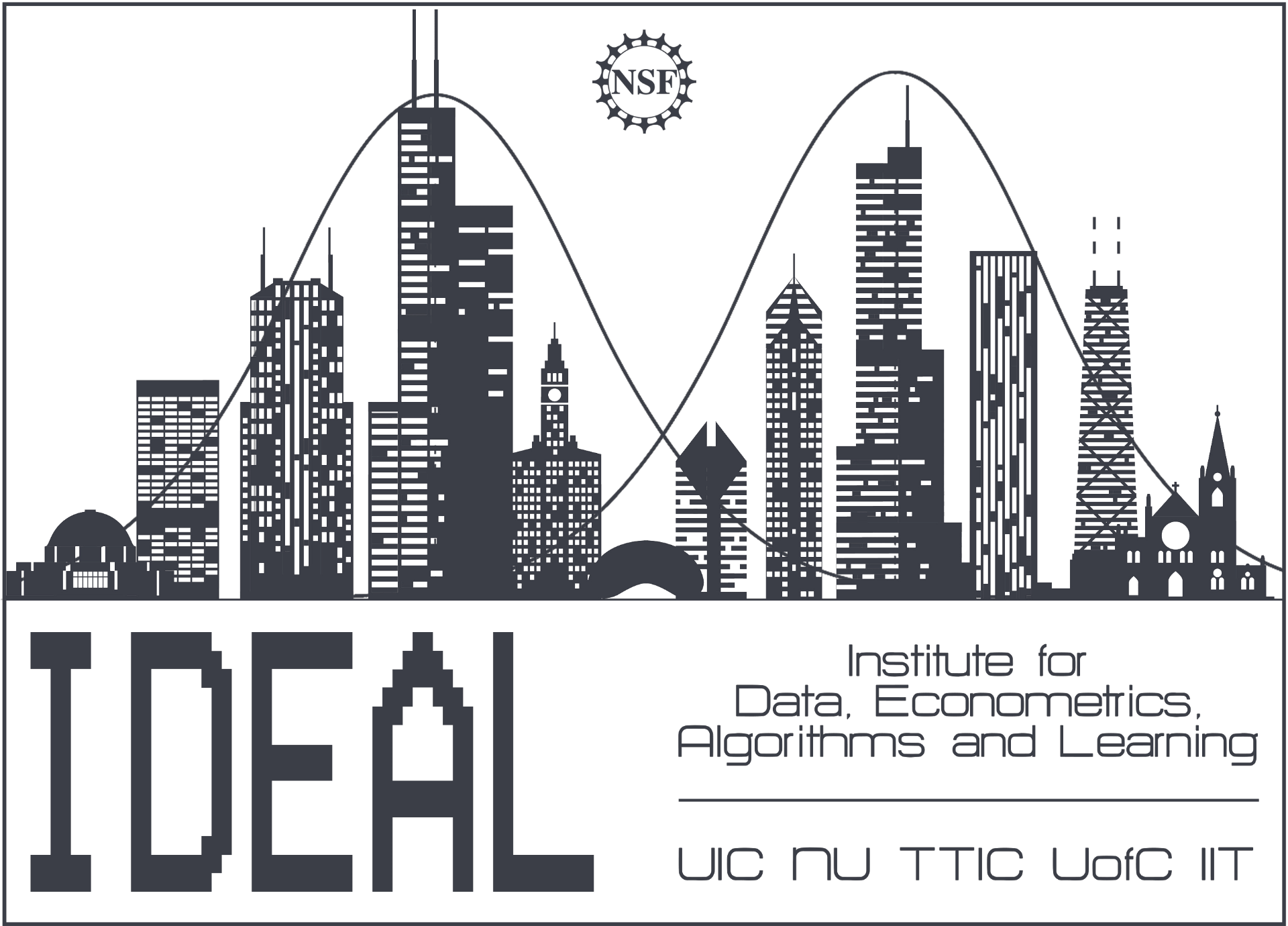Graduate students from UIC, NU, TTIC, UC, and IIT may request to take these courses and receive
credit at their home institutions (or to simply audit these courses). Note that credits received for
taking these courses might not correspond exactly with the listed course and will be determined
in consultation with the IDEAL site director of the graduate student’s home institution. Each
course will run according to the schedule of the respective university offering the course. You may
request to register for courses outside your home institution by filling out this form.
[To facilitate receiving credit at your home institution, please fill the following form.]
Academic calendars at the participating universities:
University of Illinois at Chicago: [Spring] Jan. 13 – May 2, exams May 5 – May 9
Northwestern University: [Winter] Jan. 6 – Mar. 15, exams Mar. 17 – Mar. 22
[Spring] Apr. 1 – Jun. 7, exams Jun. 9 – Jun. 13
Toyota Technological Institute at Chicago [Winter] Jan. 6 – Mar. 7, exams Mar. 11 – Mar. 14
and University of Chicago: [Spring] Mar. 24 – May 23, exams May 27 – May 30
Illinois Institute of Technology: [Spring] Jan. 13 – May 3, exams May 5 – May 10
University of Illinois at Chicago (UIC)
ECE 491 Introduction to Deep Neural Networks
Ahmet Enis Cetin Online [please contact aecyy@uic.edu]
TR 5:00–6:15 pm
An introductory course to neural networks.
ECE 491 Information and Learning (in-person)
Mesrob Ohannessian Lincoln Hall 2LH 312
TR 9:30–10:45 am
A first mathematical look at what information is, what it means to learn, and how the two are
related. This course covers the basics of statistical inference and learning under the lens of
information theory. This means that in addition to specific methods and algorithms that acquire
knowledge from observations, this course also highlights the limits of what is possible and explains
what it would take to reach them. Concepts are illustrated with applications. Topics covered:
Statistical Inference, Entropy and Compression, Concentration Inequalities, Efficiency and
Universality, PAC Learning, Model Complexity, Regularization, Mutual Information and Lower
Bounds.
Northwestern University (NU)
ELEC_ENG 422 Random Processes (in-person)
Dongning Guo Tech LG52
[Winter] MW 2:00–3:20 pm
COMP_SCI 496-13 Modern Discrete Probability (in-person)
Julia Gaudio Tech M228
[Winter] MW 12:30-1:50 pm
This is a graduate-level course focused on techniques and models in modern discrete probability.
Topics include: the first and second moment methods, Chernoff bounds and large deviations,
martingales, concentration inequalities, branching processes, percolation, and Markov chains.
Examples will be drawn from random structure and algorithm applications. The goal of the course
is to equip students to carry out their own research using the toolkit of discrete probability.
COMP_SCI 497-0-4 Prediction for Decision-making (in-person)
Jessica Hullman Tech L158
[Winter] R 2:00-4:50 pm
This graduate-level seminar course will cover recent and classic attempts to characterize good prediction for decision-making. Topics will include human versus algorithmic judgment, model-
assisted human decision making, uncertainty quantification and calibration, individualized treatment rules, and algorithmic fairness.
COMP_SCI 496 Theory of Gradient-based Optimization in ML (in-person)
Dmitrii Avdiukhin Tech (Room TBD, contact instructor)
[Winter] F 12:00-2:50 pm
COMP_SCI 497 Recent Highlights in Theory of Deep Learning (in-person)
Aravindan Vijayaraghavan (TBD, contact instructor)
[Winter] R Afternoon (TBD, contact instructor)
Graduate-level seminar / paper reading course.
Toyota Technological Institute at Chicago (TTIC)
TTIC 31100 Geometric Methods in Computer Science (in-person)
Yury Makarychev TTIC 530
[Spring] TR 11:00 am–12:20 pm
University of Chicago (UC)
DATA 37200 Learning, Decisions, and Limits (in-person)
Haifeng Xu (TBD contact instructor)
[Winter] TR 12:30–1:50 pm
This is a graduate course on theory of machine learning. While ML theory has multiple branches in
general, this course is designed to cover basics of online learning, along with basics of
reinforcement learning. It aims to establish the foundation for students who are interested in
conducting research related to online decision making, learning, and optimization. The course will
introduce formal formulations for fundamental problems/models in this space, describe basic
algorithmic ideas for solving these models, rigorously discuss performances of these algorithms as
well as these problems’ fundamental limits (e.g., minmax/lower bounds). En route, we will develop
necessary toolkits for algorithm development and lower bound proofs.
Illinois Institute of Technology (IIT)
Loyola University Chicago (LUC)
